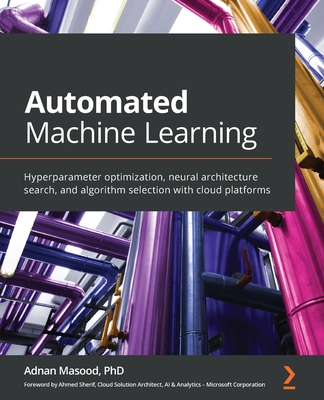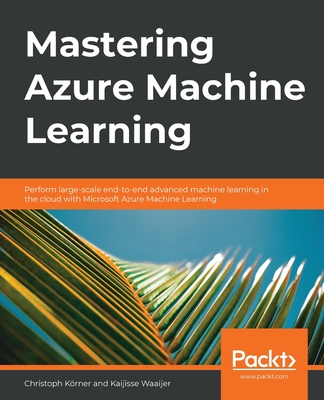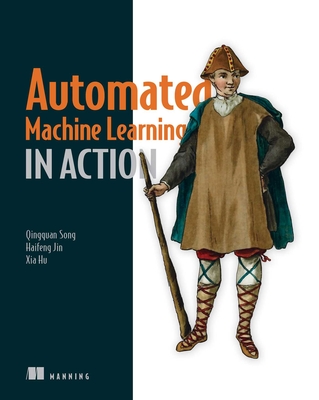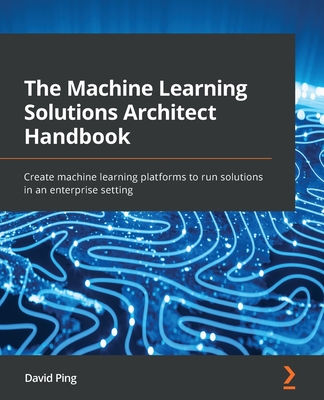Automated Machine Learning: Hyperparameter optimization, neural architecture search, and algorithm selection with cloud platforms
暫譯: 自動化機器學習:超參數優化、神經架構搜尋與雲端平台的演算法選擇
Masood, Adnan
- 出版商: Packt Publishing
- 出版日期: 2021-02-18
- 售價: $1,800
- 貴賓價: 9.5 折 $1,710
- 語言: 英文
- 頁數: 312
- 裝訂: Quality Paper - also called trade paper
- ISBN: 1800567685
- ISBN-13: 9781800567689
-
相關分類:
Machine Learning
-
相關翻譯:
自動機器學習 (簡中版)
相關主題
商品描述
Get to grips with automated machine learning and adopt a hands-on approach to AutoML implementation and associated methodologies
Key Features
- Get up to speed with AutoML using OSS, Azure, AWS, GCP, or any platform of your choice
- Eliminate mundane tasks in data engineering and reduce human errors in machine learning models
- Find out how you can make machine learning accessible for all users to promote decentralized processes
Book Description
Every machine learning engineer deals with systems that have hyperparameters, and the most basic task in automated machine learning (AutoML) is to automatically set these hyperparameters to optimize performance. The latest deep neural networks have a wide range of hyperparameters for their architecture, regularization, and optimization, which can be customized effectively to save time and effort.
This book reviews the underlying techniques of automated feature engineering, model and hyperparameter tuning, gradient-based approaches, and much more. You'll discover different ways of implementing these techniques in open source tools and then learn to use enterprise tools for implementing AutoML in three major cloud service providers: Microsoft Azure, Amazon Web Services (AWS), and Google Cloud Platform. As you progress, you'll explore the features of cloud AutoML platforms by building machine learning models using AutoML. The book will also show you how to develop accurate models by automating time-consuming and repetitive tasks in the machine learning development lifecycle.
By the end of this machine learning book, you'll be able to build and deploy AutoML models that are not only accurate, but also increase productivity, allow interoperability, and minimize feature engineering tasks.
What you will learn
- Explore AutoML fundamentals, underlying methods, and techniques
- Assess AutoML aspects such as algorithm selection, auto featurization, and hyperparameter tuning in an applied scenario
- Find out the difference between cloud and operations support systems (OSS)
- Implement AutoML in enterprise cloud to deploy ML models and pipelines
- Build explainable AutoML pipelines with transparency
- Understand automated feature engineering and time series forecasting
- Automate data science modeling tasks to implement ML solutions easily and focus on more complex problems
Who this book is for
Citizen data scientists, machine learning developers, artificial intelligence enthusiasts, or anyone looking to automatically build machine learning models using the features offered by open source tools, Microsoft Azure Machine Learning, AWS, and Google Cloud Platform will find this book useful. Beginner-level knowledge of building ML models is required to get the best out of this book. Prior experience in using Enterprise cloud is beneficial.
商品描述(中文翻譯)
掌握自動化機器學習,並採用實作方法進行 AutoML 實施及相關方法論
主要特點
- 使用 OSS、Azure、AWS、GCP 或任何您選擇的平台快速上手 AutoML
- 消除數據工程中的繁瑣任務,減少機器學習模型中的人為錯誤
- 了解如何使機器學習對所有用戶可及,以促進去中心化的流程
書籍描述
每位機器學習工程師都會處理具有超參數的系統,而自動化機器學習(AutoML)中最基本的任務是自動設置這些超參數以優化性能。最新的深度神經網絡擁有多種超參數,用於其架構、正則化和優化,這些都可以有效地自定義,以節省時間和精力。
本書回顧了自動化特徵工程、模型和超參數調整、基於梯度的方法等基本技術。您將發現如何在開源工具中實施這些技術的不同方法,然後學習如何在三大雲服務提供商中使用企業工具實施 AutoML:Microsoft Azure、Amazon Web Services (AWS) 和 Google Cloud Platform。隨著進展,您將通過使用 AutoML 構建機器學習模型來探索雲 AutoML 平台的特性。本書還將向您展示如何通過自動化機器學習開發生命周期中的耗時和重複任務來開發準確的模型。
在本書結束時,您將能夠構建和部署不僅準確而且提高生產力、允許互操作性並最小化特徵工程任務的 AutoML 模型。
您將學到什麼
- 探索 AutoML 基礎知識、基本方法和技術
- 在應用場景中評估 AutoML 方面,如算法選擇、自動特徵化和超參數調整
- 了解雲端和操作支援系統(OSS)之間的區別
- 在企業雲中實施 AutoML 以部署 ML 模型和管道
- 構建具有透明度的可解釋 AutoML 管道
- 理解自動化特徵工程和時間序列預測
- 自動化數據科學建模任務,以輕鬆實施 ML 解決方案並專注於更複雜的問題
本書適合誰
公民數據科學家、機器學習開發者、人工智慧愛好者,或任何希望利用開源工具、Microsoft Azure 機器學習、AWS 和 Google Cloud Platform 提供的功能自動構建機器學習模型的人,都會發現本書非常有用。需要具備初級的機器學習模型構建知識,以便充分利用本書。擁有使用企業雲的經驗將是有益的。
作者簡介
Adnan Masood, PhD is an artificial intelligence and machine learning researcher, visiting scholar at Stanford AI Lab, software engineer, Microsoft MVP (Most Valuable Professional), and Microsoft's regional director for artificial intelligence. As chief architect of AI and machine learning at UST Global, he collaborates with Stanford AI Lab and MIT CSAIL, and leads a team of data scientists and engineers building artificial intelligence solutions to produce business value and insights that affect a range of businesses, products, and initiatives.
作者簡介(中文翻譯)
阿德南·馬蘇德(Adnan Masood),博士,是一位人工智慧和機器學習研究員,斯坦福人工智慧實驗室的訪問學者,軟體工程師,微軟 MVP(最有價值專業人士),以及微軟的人工智慧區域總監。作為 UST Global 的人工智慧和機器學習首席架構師,他與斯坦福人工智慧實驗室和麻省理工學院 CSAIL 合作,並領導一支數據科學家和工程師團隊,開發人工智慧解決方案,以產生商業價值和洞察,影響各種業務、產品和計劃。
目錄大綱
Table of Contents
- A Lap around Automated Machine Learning
- Automated Machine Learning, Algorithms, and Techniques
- Automated Machine Learning with Open Source Tools and Libraries
- Getting Started with Azure Machine Learning
- Automated Machine Learning with Microsoft Azure
- Machine Learning with Amazon Web Services
- Doing Automated Machine Learning with Amazon SageMaker Autopilot
- Machine Learning with Google Cloud Platform
- Automated Machine Learning with GCP Cloud AutoML
- AutoML in the Enterprise
目錄大綱(中文翻譯)
Table of Contents
- A Lap around Automated Machine Learning
- Automated Machine Learning, Algorithms, and Techniques
- Automated Machine Learning with Open Source Tools and Libraries
- Getting Started with Azure Machine Learning
- Automated Machine Learning with Microsoft Azure
- Machine Learning with Amazon Web Services
- Doing Automated Machine Learning with Amazon SageMaker Autopilot
- Machine Learning with Google Cloud Platform
- Automated Machine Learning with GCP Cloud AutoML
- AutoML in the Enterprise











